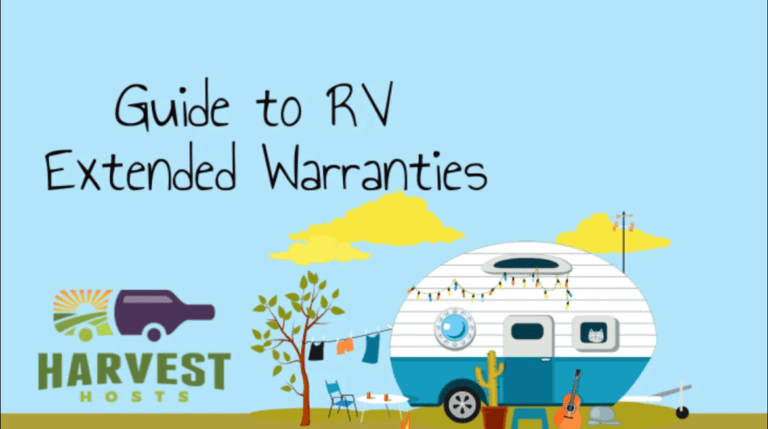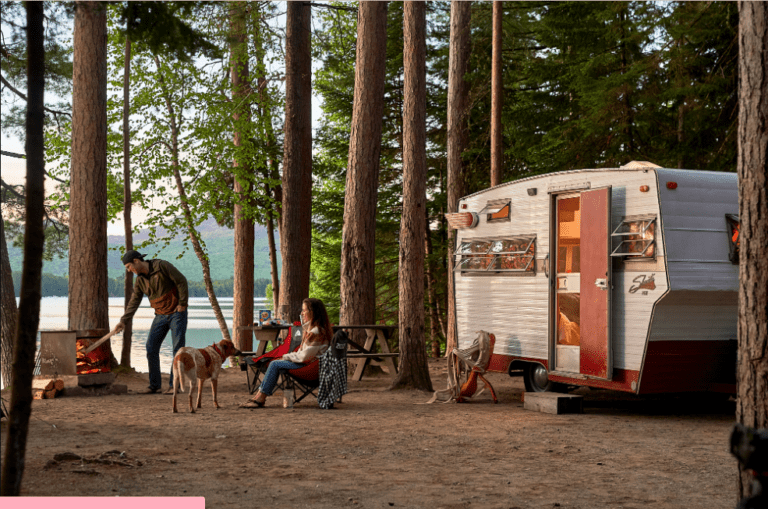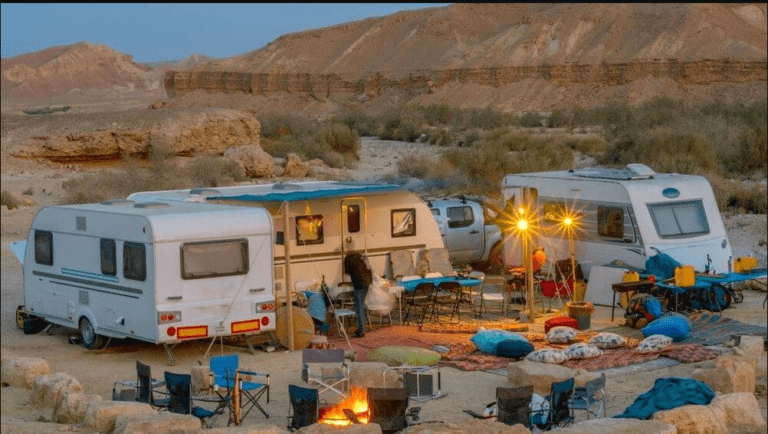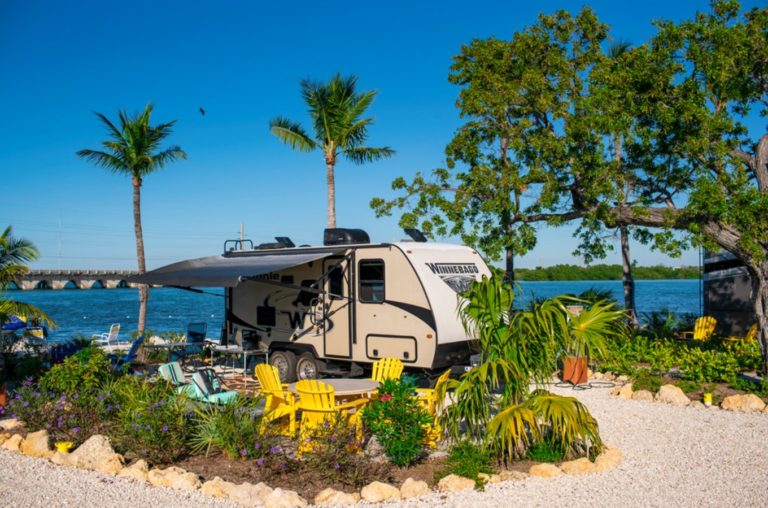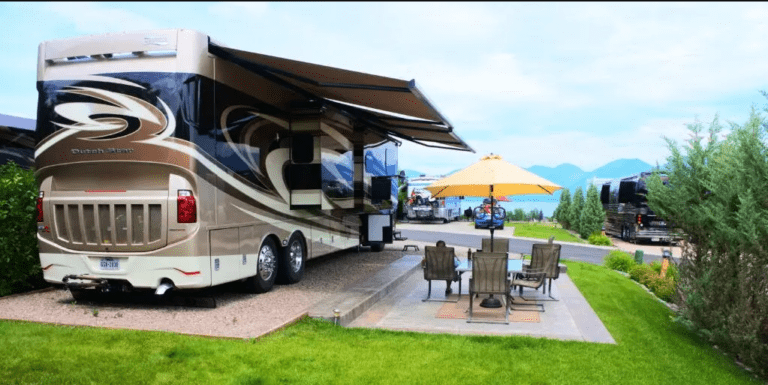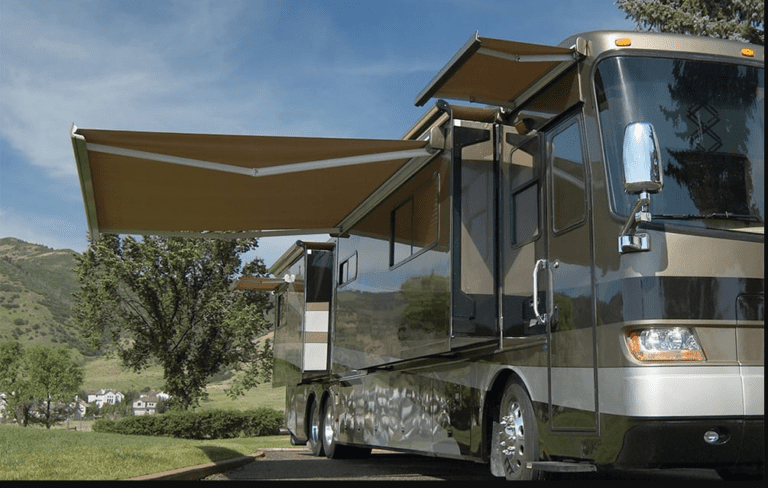Best RV Buying Tips

Buying an RV is a big deal. These home wheels don’t come cheap, and you’ll want to make sure you get it right when you pay for them. Unfortunately, if you’ve never bought an RV before, it can be very difficult to know what to look for. In fact, even those who have owned RVs in the past may not know the best tips for buying an RV.
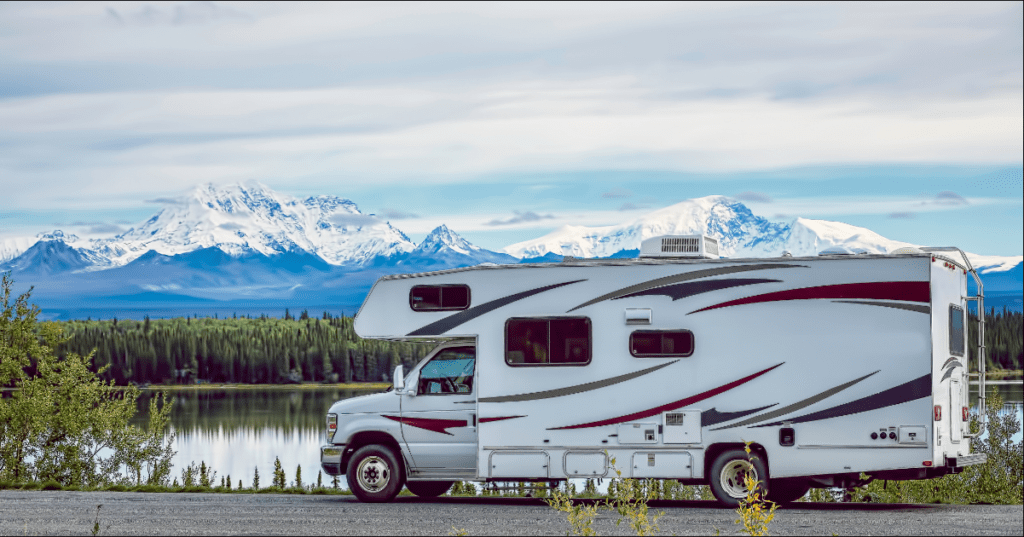
Road tripping across North America in an RV is one of our favorite ways to travel, but buying and owning a recreational vehicle shouldn’t be a spur of the moment decision. There’s a lot you should know before you make the biggest purchase of your life and embark on the adventure of a lifetime.
Lucky for you, we’re here to help. In this article, we’ll give you our best RV buying tips. These tips will ensure that you like what you buy and that you get the best deal.
Do the research first.
First of all, you must do your research before anything else. Hop online and look at RVs to get a feel for what’s available. Read reviews of different manufacturers and note which one’s people like and which they don’t like so much. Know which brands you are willing to buy and which ones you won’t touch.
Also get research.
Also do some practical research, Hamilton says: “Rent an RV and spend a weekend or so with it to decide if you like the lifestyle. RVs There are many different sizes and types — Class A, B, and C, travel trailers, fifth wheels, toy haulers, and more. Your perfect RV depends on the size of your family, how often and where you’ll be traveling. have been, and how comfortable you are driving. They are too scared to drive.” All of this may be more complicated during the coronavirus restrictions, but another useful rental experience would be staying at an RV park, where “you can check out other people’s rigs and their personal experiences, good and bad.” Can receive criticism,” says Hamilton. “RVers are almost always friendly and willing to share their stories.”
Pay attention to floor plans.
During your research, look around and visualize yourself using different floor plans. Where will you store certain items? Where will each person sleep? Is there room around the table for family movie night or dinner? What will the day look like on the move?
Asking yourself these things will help you narrow down your options, giving you a short list of floor plans and RV types that will fit your needs.
Get up close
Once you have a good idea of the brands and floor plans you want to look at, find a way to get close to each one and really check it out.
If you can, rent an RV for the weekend to see what works and what doesn’t. Head to the RV Show and go through the different rigs. Even going to a dealership and driving past the RVs there can give you an idea of what’s going to work.
Consider buying used.
You’ve done your research and you know what you want. Our next tip is to consider buying a used rig. RVs depreciate significantly when they drive off the lot, meaning a new RV is a terrible investment. An RV that is a few years old but has been well maintained will cost much less, and you will be spared any of the problems that arise during the initial hustle.
Have an inspection.
Before buying a used rig, make sure you have it professionally inspected. Yes, it will cost you a bit of money, but it’s totally worth it knowing you’re buying a solid unit that’s free of major issues.
You may be tempted to skip this step and view the RV yourself. While you may want to do your own inspection, you don’t want to skip a professional inspection. In fact, this may be our most important RV buying tip.
Skip the auction.
Heading to an RV auction can seem like a great way to save some money when buying your rig. This may be true for those who have been buying RVs for years and know exactly what to buy and what to avoid, but it’s definitely not the way to go in most cases.
Time things right
One of our most important RV buying tips is to time things right. You can really save money by buying at the right time. For example, buying in the beginning or middle of the camping season is going to cost you more than buying in the fall or winter. Meanwhile, those who shop at a dealership on a slow Tuesday will likely get a better price than customers who shop on Saturday.
Compare and negotiate.
Let’s say you’ve done your research and you’re looking for that rig to pop up somewhere. You see one in your city, but it’s listed above what you’re willing to pay. We highly recommend looking around to see if there may be another listed in a neighboring state for a lower price. Thousands of dollars in savings are worth a day’s driving.
Another option is negotiation. Talk to the seller and see if they might be willing to sell for a lower price. If the seller isn’t willing to increase the price, you can try adding extras (like new tires or minor repairs).
Know your warranty.
If you buy from a dealer and the warranty is offered by the dealership and not by a third party, make sure you know what’s included before you buy.
Ask the dealer to tell you what will and won’t be covered, and take notes. Additionally, you can look at reviews of the warranties that the dealer in question offers to see what people have to say about them.
Insist on a walkthrough.
Finally, when buying a rug, it’s important that you insist on a walkthrough with the seller. Ask them to show you how an RV works. Check equipment, slides and water systems. Learn how to hook up electricity and water as well as dump tanks. Ask any questions you have, and keep your eyes peeled for problems the inspector may have missed.
Ready to start shopping? Put these RV buying tips to good use and get out there and find the RV of your dreams. After all, the sooner you find the perfect rig, the sooner you can start your amazing camping adventure!
Know your tow vehicle.
If you’re looking at a trailer, it’s important to know whether the vehicle you’re currently driving has the ability to tow it on the road. If you’re driving a truck or SUV, you should be fine, but if you have a small car, you’ll want to look at other options.
It is the same process as buying a car.
While it may feel like you’re buying something closer to home than a car, the shopping and purchasing process is no different than what you’ve experienced buying any other vehicle.
Make sure it is inspected and serviced.
Even if it’s direct from the factory (and especially if you’re buying used), you’ll want to make sure your RV is 100% safe and roadworthy before you buy it. Let’s run it. The worst place to find out about an unexpected problem is when your hundreds—perhaps thousands—of kilometers from home.
Great deals can be too good to be true.
Make sure you are 100% satisfied with the condition of any used RV you are considering. You might be able to get a great deal, but older vehicles often require extra work and any money you save could eventually be spent on expensive maintenance and repairs. Buying a new RV may be more expensive initially, but—in addition to enjoying the benefits of all the latest technological advances—you’ll likely get more out of it in the long run.
You need a place to put it.
Did you know you can park your RV in your driveway for just 24 hours? Before you buy your RV, you need to know where it will be stored when you are not using it.
Camping often requires advance planning.
Many people buy RVs with the idea of getting into one, hitting the road and stopping at any campsites along the way. Remember that RVing is a popular pastime and many campsites have limited space to accommodate RVs, so those sites are regularly booked up in advance.
Explore the online RV community.
Visiting online RV communities is a great way to learn everything you need to know about RV ownership and travel from people who have made it their lifestyle. Use these sites to learn about amazing places you’ve never considered and to meet people who could become campsite buddies in the future.
Visit the dealership.
We found ourselves stopping at every RV dealership we passed along the road. Sometimes we would talk to the salesman and get tips, recommendations and brand information. Other times we’ll visit as many units as possible to get a feel for the variety of layouts, brands and lengths we like. You have to familiarize yourself with RVs and this is the best way to do it.
Create a “wish list.”
One thing that helped us find the right 5th wheel was making a “must have” and “want” list, just like we did when we bought our first home. First, write down what you want for your RV. It’s okay to be very specific and picky at first, let yourself dream a little. Then from that list, you can determine which of these desires are “must-haves” and which are “non-negotiables.” Think about things that match your lifestyle and place more value on those things than cosmetic details. To give you an example, some of our biggest non-negotiables were:
- Price/Budget
- All Seasons (Our home is in Colorado, so we need an RV that we can use in the winter)
- At least 1 slide
- Good storage
- Weight (if you are towing your RV, you need to make sure your truck can handle the gross vehicle weight rating of your RV)
Don’t reject used RVs.
We were advised to buy a used unit vs a brand new one. Like a normal vehicle, RVs depreciate quickly and brand new doesn’t always mean fewer problems. In fact, we’ve heard from many fellow RV errs that they have just as many, if not more, problems with their brand-new rigs than with their used ones. In our opinion, it seems that sometimes it takes a few years for a unit to “break in” and work out its problems. Also, there are many people out there who buy brand new RVs but rarely use them themselves. Then, when they get tired of paying to store them, they decide to sell. You can save yourself some serious cash by buying from these guys! The best part is that they are usually used gently too! Buying brand new may be your best option, but we recommend that you also shop used!

Here are a few side tips for buying used:
- Set up Craigslist and RVTrader search alerts. By using their “Saved Search” features and applying filters that match your needs, you can receive alerts on your phone or via email when new RVs matching your needs are posted. Sometimes used RVs listed on these sites will sell within hours so you need to be able to jump on them!
- Also check out the Facebook marketplace and buying and selling trade group pages for your area. We actually found the fifth wheel we bought on the new Facebook Marketplace! Craigslist scams have put people off buying and selling there, and some people feel more comfortable selling on sites like Facebook where people have profiles so you know who to message with. have been.
- If you’re willing to travel to find the right RV, check out listings in other nearby cities/states as well. If you’re willing to drive or move to another city, you open up many options for RVs!
- Bring people along to check out the RV. If you have someone who knows a lot about RVs, ask them to join you when you go check out a unit before you buy it. No matter what kind of decision you’re making, it’s helpful to have someone there to help you think through everything. There are a lot of terms used with RVs and it can be intimidating at first if you don’t know much about them. Having support helps a lot.
- Make sure the seller shows you everything works. Whether you buy used from a dealer or an independent party, hook up an RV with them and prove that everything they say works, really works. Even if you’re not sure how to check the operation of an RV, ask them to show you. If they refuse, you probably don’t want to buy from them anyway. We didn’t when we bought our fifth wheel, which wasn’t smart. It was winter when we bought, so the unit was winterized and we used that as an excuse not to test everything. It doesn’t take that long to winterize a unit, it’s worth it! Check a/c, heat, water, electricity, etc. (don’t ask someone to winterize the unit unless you are going to buy the unit if it all works :))
Really understand how you plan to use your RV
When choosing an RV, it is extremely important that you find one that fits your lifestyle.
You may be someone who is choosing an RV primarily for adventure. Perhaps you’re planning to visit as many national parks as possible, boondock as much as you can, and expect to spend most of your time outside of your RV doing outdoor activities. If that’s you, you’ll need an RV that doesn’t limit you by its length, maneuverability, or boondocking capabilities. For boondocking, you’ll need to think about things like tank capacity and power options (using solar panels or a generator).
On the other hand, you may be someone who plans to work full-time from your RV or you may be homeschooling your kids on the road. Perhaps, you want the comfort, space and amenities of home while traveling. This will likely lead you to park at most RV parks and campgrounds with hookups and Wi-Fi. So, you won’t have to worry too much about length restrictions and boondocking capabilities.
Maybe you’re like us, and you want a little bit of both. We haven’t thought about what needs to be done to boondock our RV. We inadvertently limited ourselves to boondocking for longer than a few days because our holding tanks are really small. We also underestimated the size of the generator we’d need to power up our larger unit, which also meant we couldn’t really go places where we’d need to run the air conditioner all day. Another thing we didn’t think enough about was payload capacity. We made sure that GVWR was a good match for our truck, but we didn’t think about how much stuff we could put into it. Our RV only has a payload capacity of 1,000 lbs., which isn’t much, especially when you’re a full-timer. However, we knew that since we were working full-time from our RV, had 2 large dogs, and wanted enough space and comfort to maintain this lifestyle for as long as we wanted, we needed something spacious enough. Required. We are very comfortable living and working out of our RV and it definitely fits our lifestyle well. However, we wish we had thought more about boondocking because it would have given us more free spots!
Don’t overextend yourself
First set a budget and then stick to your budget. One of the benefits of full-time RVing can simplify and lower your cost of living. It’s easy to get carried away with all the great amenities they offer these days. Don’t lose yourself in fancy countertops and leather sofas and remember what’s really important. You can always make small cosmetic changes to the interior, but replacing the water heater, air conditioner, etc. is very difficult. Second, prioritize the things you can’t change about the RV. Remember how you actually plan to use your RV and meet your requirements for tank storage, weight limits, payload capacity, etc.
Consider private sellers.
Kimberly DeCarrera, the writer behind RV Tailgate Life, a blog dedicated to the tailgating, travel, and RVing communities, is on her second RV, but she bought it the first time from a private seller. “You can go to RV Trader and RVT to find private sellers. Some people also have success on Craigslist, eBay, and Facebook Marketplace.” During your search, also join social media groups and pages with RV-related information and tips for connecting with potential sellers. “Surprisingly, Facebook groups and RV forums are another good source for buying an RV, especially a used one,” notes TrailingAway.com’s Brook Baum, who with her husband, Buddy, owns a full-time RV. They travel.
Avoid buying on beaches.
Vehicles bought on the coast, especially the wet East Coast, are notorious for dying before their inland counterparts. “I’m always hesitant to buy an RV from a coastal area,” says DeCarrera. “Salt and water will cause corrosion. Look for salvaged RVs that have been damaged by floods. These are often uninsurable due to severe water damage and mold, so a deal can be great to have in place.” “
Insist on inspection.
While Beasley notes that with private seller purchases, “you can usually tell if they’ve taken care of it or not,” RV buyers still need to inspect the vehicle before handing over any cash. A plan should be made. DeCarrera agrees: “I’ve seen so many stories of RV buyers being scammed because they trusted online sellers.” Baum notes that an inspection will give you piece of mind. “There are hundreds of components in an RV,” she says, “and some things like mold or faulty wiring aren’t things you want to know about on your first RV trip.”
Auctions are not for the faint of heart.
If you have the cash and trust your experience and knowledge, there are deals to be had at auctions. But buyer beware. According to Beasley, many things can go wrong with RVs bought at auction, and once money changes hands, you’re on your own. “I would never buy at auction,” she says. “There is a high chance of major problems for the vehicle.”
Consider the old-fashioned way: your local dealer
“For my second RV, I bought new from a dealer,” noted DE Carrera, “I bought from Campers Inn in Byron, Georgia, and was very satisfied with the purchase process and follow-up service.” Beasley agrees. “Your local dealer is the obvious first place to look for RVs,” she says. “It’s a great way to get your eyes on a lot of different layouts and designs.”
Read reviews
If you decide to go the dealer route, keep an open mind but take convincing reviews by heart. “We haven’t found any particular RV dealer or brand particularly prominent enough to identify them,” Hamilton says. “If you do research online, it will become clear where you will be treated best and what other people like.” And, Beasley notes, “Like a car dealership, their primary mission is to sell as many RVs as possible. They’re probably not looking out for your best interest.” So, again, do your research and head to the lot armed with knowledge.
The timing of your purchase is correct.
Grant Sinclair and his wife, Bonnie, run a blog called Our Wanderlust Life, documenting their time on the road with their travel trailer. According to him, not all seasons are created equal when it comes to scoring great dealership prices on RVs. New models, he notes, typically come out in the fall and early winter, which can be a great time to buy as dealers try to clear out last year’s models and make room. – which they often do with huge discounts. This also happens when the summer camping and travel season is over, so not as many people are buying, which can turn into bargains. Sinclair says this is not a hard and fast rule, and exceptions should be expected. For example, he bought his RV in the spring and still got a great deal.
Consider shopping at the end of the month.
Just as the weather can sometimes determine the price, so can the time of the month. “It can be beneficial to make a new purchase near the end of the month,” Beasley says. “Salesmen often have a quota to meet. They are more capable and more likely to give you the best deal at the end of the month to make quota and improve their bottom line.”
Also check out RV Shows for deals.
Sites like RV Miles list the most important shows in the United States and Canada, where you can meet sales people, browse the latest models, compare features, price models of interest, and Yes, you can buy the RV of your dreams. (Whenever shows aren’t canceled due to coronavirus concerns.) “[The shows] are really great for finding what you want — a lot of different things with a lot of different features in one place. types of RVs — and the salesmen and finance companies to talk to for pre-approvals or pre-negotiations, even if you don’t buy at the show,” says DeCarrera. “I definitely recommend that you cruise several shows before you buy.”
Compare the price.
Shows are a great place to find the RV of your dreams, and you can definitely find good prices at shows. However, you’d be wise to be patient and check the price before spending any money. “Once you’ve found the make and model you want, go online and search for models around the country,” says Sinclair. “We bought ours 90 miles away and saved a lot of money by making the drive.” DeCarrera also recommends visiting local dealerships near the shows. “Buying at RV shows can be hit or miss. They often have great deals on RVs, but you can often find ‘show prices’ at local dealerships.”
Shop on the last day of the show.
Just like with dealer purchases, the timing of your decision to buy at an RV show can be the deciding factor. Baum thinks you’re likely to get a lot more value because the show is over. She notes that some RVers have gotten deals this way “because dealers don’t want to have to back rigs on their lots.”
Negotiate – and never pay full price.
No matter where, when, or who you buy from, communication is key. “Never pay full price for a new RV,” says Hamilton. “They’re too expensive.” He bought his used 2010 travel trailer in 2014 for well below the asking price of $16,000. told them I’d pay $10,000 out the door, with no extra fees, and that’s what I got after a lot of negotiating,” he says. “I’ve just waited for them. It’s the same with buying any other type of vehicle. Be prepared to walk away from the deal. Don’t fall in love.” Baum agrees. “RVs are marked up a lot,” she says. “So, if you negotiate, you can get 20% to 25% off MSRP. can.”
Ask for additional features.
Finally, you should consider looking for bells and whistles as part of the negotiation. “Negotiate as much as you can with the dealer when it comes to getting the best deal,” Sinclair says, then ask them to include key items such as a weight-distributing barrier, slide toppers, or solar panels. throw away These are expensive. But useful add-ons, and you’ll be glad you installed them.”
Focus on the floor plan more than the brand.
No matter where you buy — private seller, dealer, or RV show — don’t go into a deal with your heart set on a particular brand. The floor plan, Sinclair suggests, should trump the manufacturer. “The important thing
Consider a factory tour.
To help determine which brands won’t sell you an RV you’ll regret, take a factory tour. (Again: these likely won’t be available again, or should not be taken, until the coronavirus is in the rear view.) Some manufacturers choose to give them a chance to give the public a chance to see the quality of their products. Offer. Baum recommends taking them to the dealership to get a look at the manufacturing process and the inner workings of the RV you’re considering buying. “Their websites are also full of valuable information such as floor plans, specifications, and video tours,” Baum says. “While visiting a dealer can be very helpful in seeing which RV will fit you best, it’s also important to do a lot of your own research because the dealer likely knows all the features and quirks of each RV. Don’t know.”
Find out what the warranty covers.
After making the final purchase decision, there are many factors you need to pay attention to—one of them being the warranty. “You’ll get a warranty on your new RV. Don’t get confused by chassis warranty vs. items inside the home like refrigerators, hot water heaters, air conditioners, generators, etc.” Many RVers also buy extended warranties, Hamilton says. “It’s much more expensive to replace something in an RV house than it is to do it in your home.”
Insist on and document a walkthrough.
The next post-purchase factor to pay close attention to is the walkthrough. “When you buy an RV, get the seller—whether it’s a private seller or a dealership—to do a complete walkthrough of all the systems inside and outside the RV,” says DeCarrera. “Videotape it because, even if you’re taking notes, you’re getting so much information at once, there’s no way to remember everything. And you probably won’t know what to write down.” Was it necessary or not.”
An RV – without regrets
If this is the year, you’re finally going to realize your dream of buying an RV, congratulations — few things can compete in terms of freedom and adventure, especially during a pandemic. But instead of seeing an RV as your ticket to chasing your passion for a carefree life on the road, think of it for what it is: a five- or six-figure investment that quickly depreciates and Comes with a seemingly endless list of things. Which could possibly be wrong. From where and when to buy, to factors you may not have considered, to what to avoid, here’s some expert advice, tips, and tricks on how to leave the dealer with the RV of your dreams and the buyer. Have no regrets.
Thinking about buying an RV? Read this tip first.
If you’re just starting your RV adventure, you’re not alone. More than 72 million Americans plan to take an RV trip in the next year. There is no right or wrong way to go RVing, but the majority of people buy an RV to explore and travel in comfort.
Near or far, traveling to national parks or RV resorts, you have many entertainment options. Your RV can take you to new places for hiking, kayaking, fishing, or other outdoor activities. Or just relax in the great outdoors and get away from the city. The possibilities are endless, you must first decide if RV ownership is right for you. To help you do just that, we’ve compiled this list of all the most important questions to ask yourself before buying an RV.
How do I use my RV? How Often Will I Go RVing?
When you consider buying an RV, you need to understand how much you will actually use your RV. Things like work, school schedules, or other family commitments can affect how often you can go away.
Many RV owners use their RV primarily for summer vacations with family. Avid RVers may camp more consistently throughout the season (or extend their trips into the fall), while more efficient campers primarily plan weekend getaways and short trips.

On the other hand, many people known as “snowbirds” use their RV to escape the winter months. These RVers “migrate” away from the cold by living in warmer southern states. Their RVs serve as a secondary home and they may stay in the same location for weeks or months at a time.
RV owners can also be classified as adventure seekers. These RVers want to explore the world at every opportunity and they use their RV to do just that. These individuals take every moment to plan trips filled with outdoor activities.
You may also be considering full-time RV living. Full-time RVers work on the road and embrace a nomadic lifestyle 365 days a year. These RVers may stay in one area for a few weeks or months, but they never truly settle down.
Finally, factor in follow-up service
A seller’s follow-up service package can be one of the biggest considerations. “It’s pretty common in the RV industry to have trouble getting service done on your RV,” says DeCarrera. “Due to the limited number of RV service centers and the complex nature of RV repair, quality repair shops are in high demand and in short supply. As a result, many RV dealers will refuse to work on an RV, even if it Even if it’s under warranty, if that dealership doesn’t sell the RV. From that point of view, it’s a good idea to buy from an RV dealership close to home.” Hamilton agrees: “It’s a saying that the first year of a new RV’s life is a bumpy ride with frequent visits to the service department,” he says. “Local dealers will usually give first consideration to people who bought their RV from them. If you bought a new RV from a dealer hundreds of miles away, your local dealer may be obligated to service it., but you may have to wait in line. And before they can or will help you. “But there are going to be other things you love about it and even more incredible memories made. So, try to have fun and don’t worry about finding the perfect RV. Enjoy the process and find the perfect RV for you!
You may find yourself in the middle of a long search to find the right RV. Just like finding the right home, finding the right RV can be exhausting. One thing we lost sight of during this process was that owning an RV is fun, and therefore buying an RV should be fun too! Just know ahead of time that no matter what RV you buy, things are going to break, and there will be little things you won’t like about it. Focus on the brand over the seller.
While destination plans are important, Beasley believes the brand should come before the person or place you buy your RV from. “What brand you buy is more important than who you buy from,” she says. “There are so many RVs that are built with such cheap construction, they’re bound to have a lot of problems from the start.” Beasley recommends Tiffin, New mar, and Coach house for motorhomes, and for trailers, Outdoor RV, Northwood Manufacturing, and Grand Design.
